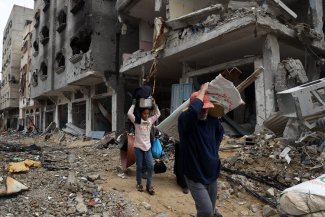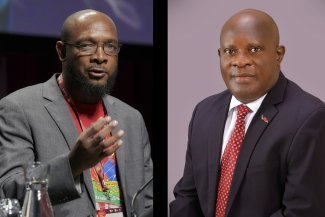The 2015 edition of the World Social Forum (WSF) closed this Saturday with a march in solidarity with Palestine through the streets of Tunis, which was hosting this grand annual celebration of alter-globalisation for the second time.
During four days, over 1000 workshops, seminars and round tables brought together members of associations, NGOs, trade unionists, researchers and activists from 120 countries at the El Manar University campus, decorated for the occasion with countless posters and drawings calling for more fiscal justice, a healthy environment, free universal healthcare, new consumption models, or a people’s revolution.
The Forum provided some organisations with a chance to sharpen their arguments in the run-up to two major events this year : the 21st Conference of the Parties to the United Nations Framework Agreement on Climate Change (COP 21), at the end of 2015, and the UN Special Summit on Sustainable Development, which will give birth to the new post-2015 agenda as the Millennium Development Goals (MDG) reach their deadline.
According to Barbara Adams, senior policy advisor at the Global Policy Forum (GPF), “The MDGs are frankly disappointing on the whole and have not been reached. But they have been a mobilising force for many organisations. What is also worrying is the way they were drawn up. It was done behind closed doors and with very little participation.”
“What we are now observing is a reaction to that, with many people conscious of the new targets to be reached and determined to be involved.”
Adams argues that the awareness built up about climate change and the growing inequalities in the world over the last fifteen years has reframed the debate within civil society organisations, underlining the urgent need to tackle the direct consequences of both these problems affecting humanity as a whole.
Evidence of this can be seen in the joint call published on the eve of the Forum by the directors of five heavyweight NGOs such as Greenpeace, Oxfam and ActionAid, placing inequality (the power of the 1%), the environment, climate change and women’s rights at the centre of the struggles to be waged.
In its final declaration, the Assembly of Social Movements, for its part, returned to the foundations on which the Forum has been built since its advent in 2001 in Porto Alegre, Brazil, less than two years after the “Battle of Seattle” put the spotlight on the WTO and its promotion of free trade.
It points the finger, first and foremost, at the “transnational corporations and the financial system (IMF, WB and WTO), who are the main agents of the capitalist system, privatizing life, public services and common goods such as water, air, land, seeds and mineral resources, promoting wars and violating human rights, and ransacking resources”.
It is a text that echoes the Charter of Principles drawn up by the pioneers of the WSF, united under the banner “another world is possible”, asserting that the fight should focus on these international trade representatives. The World Social Forum was designed to incarnate civil society’s response to the World Economic Forum in Davos, and the two events used to be held simultaneously, which is no longer the case.
Fifteen years on, this analysis of the structural flaws in the economic system remains pertinent for many activists, but the urgency of the stakes are now such that a French activist argues : “As long as we don’t have another system than capitalism, rules have to be set to limit the damage”.
A Belgian trade unionist agrees and defends the idea of an alliance between various organisations, saying he is “convinced that it is not the trade union world that is going to change the system ; because we are part of the system from the moment we sit at the same table with governments and the bosses”.
“We could envisage the development of a public service for environmental protection,” says Nathalie Guay of the international department of the Confédération des Syndicats Nationaux (CSN) of Quebec.
She argues that the climate change issue is central to creating a favourable balance of power between civil society, the government and the private sector.
“Research has been conducted by the environmental and trade union movement showing that if we focus on the production of renewable energies and leave fossil fuels behind, we will create many more jobs than if we continue down the current path.”
Young Tunisians at the heart of the WSF
Despite a lower turnout than expected – the organisers’ latest figures indicate 40,000 to 50,000 participants, rather than the 60,000 initially expected – Alaa Talbi, one of the coordinators of the 2015 Forum, draws a “positive” assessment.
“Despite the problems and shortfalls, it has been a successful edition,” he says, alluding to the occasional organisational chaos and unfortunate episodes marking the WSF : the protests of hundreds of young volunteers, disgruntled with their lodging conditions and the payment of their expenses ; a few banners calling for the destruction of Israel ; and a physical assault on people taking part in a debate on Western Sahara by a group of protestors claiming to be from Algerian civil society.
But for Talbi, this 2015 edition had the merit of showing the resilience of Tunisian society and its young people, who were present en masse during the Forum, in a country seriously wounded by the terrorist attack staged at the Bardo museum less than a week before the start of the activities.
This attack also led to the issue of terrorism and religious fundamentalism being placed on the menu of discussions during the WSF. The organisers, moreover, are planning to publish a “Bardo Pact” against terrorism “and in support of oppressed people”.
They also celebrated the upcoming creation of an “African citizen university” aimed at establishing partnerships between the academic world and civil society on the continent, as well as a “North African migration observatory”.
According to Asma, a 24-year-old Tunisian student, “Having a forum in our country is always an interesting idea. It opens the door to discussions and the sharing of ideas.”
Like many young people of her generation, who have witnessed or taken part in the Tunisian revolution of 2011, employment nonetheless remains one of her main concerns. Her friend Mohamed, aged 25, feels the Arab spring has had a negative impact on the economy, due to the political instability that followed the departure of the former president, Ben Ali.
“But regardless of the state of our country today, we will never regret having had this revolution,” concludes Asma. “Never.”










